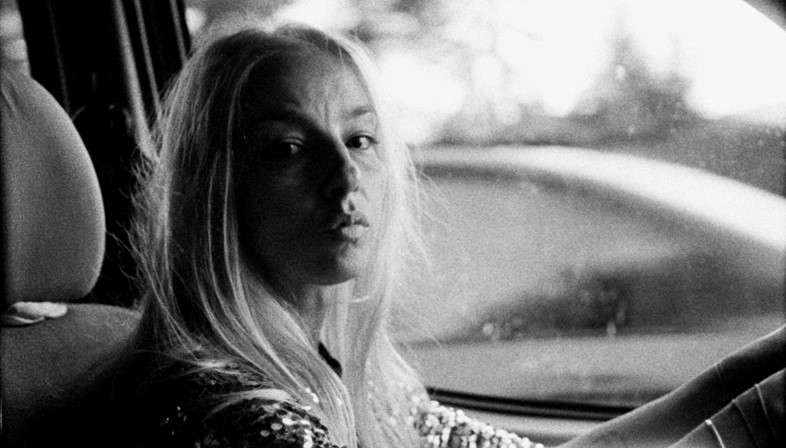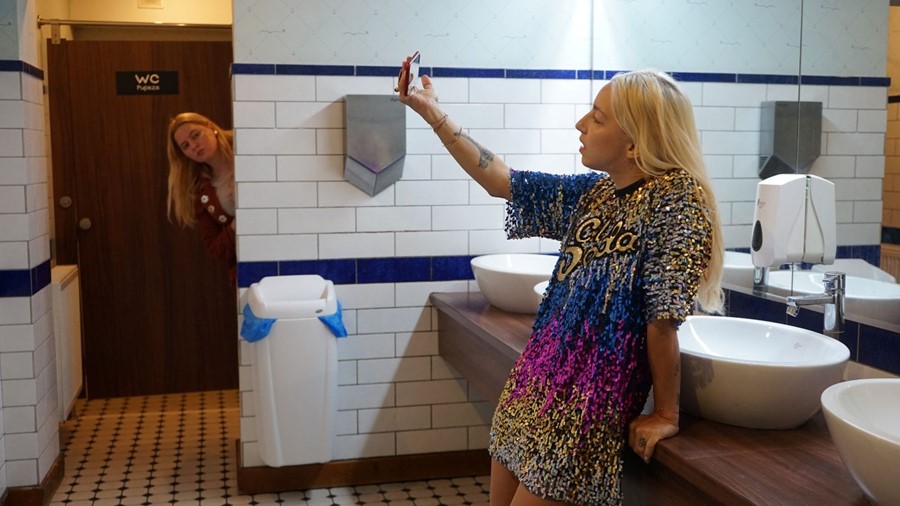The provocative Romanian filmmaker speaks to Dazed ahead of the UK release of his latest film, Do Not Expect Too Much from the End of the World
Radu Jude’s film Do Not Expect Too Much from the End of the World is about women who drive. But rather than offering the exhilaration and freedom promised by girls and fast cars, instead we see the bleak aspects of car culture under the gig economy. The film follows 20-something Angela (Ilinca Manolache), a PA for a production company, during a 16-hour shift driving around Bucharest.
Angela has been sent by her employer to record interviews with factory workers who have suffered paralysis or dismemberment while working overtime in hazardous conditions (her company wants to make an ‘inspirational’ workplace safety video to encourage other workers to wear their helmets to avoid a similar fate). Filmed in black-and-white 16mm, the film is intercut with archival footage from the 1981 Lucian Bratu feature Angela Moves On, which also centres around a female driver, created under the eye of censors in the era of communist dictator Nicolae Ceaușescu.
In Jude’s film, the car windows appear like another cinema screen, capturing the shiny skyscrapers, the poorer neighbourhoods, and a highway of crosses. Jude examines an overworked and underpaid society living under the spectre of late capitalism. Everything enjoyable in life becomes a form of distraction: eating, music, sex, TikTok. Angela blasts Romanian turbo-folk, drinks endless energy drinks, fucks an older man between meetings (she doesn’t come, of course), and makes countless TikToks as ‘Bobita’, a hilarious Andrew Tate alter-ego, delivering misogynistic tirades under a bald, bushy-browed filter. Manolache invented the alter-ego during lockdown to entertain herself, as if channelling all the toxic images we consume and spewing it back out – a metaphorical tactical chunder.
Jude is both enamoured with and suspicious of images and the ways they can be defined. In one instance, the Austrian boss tells the team to film the video with “emotion”, before his manager sarcastically quips: “He means a close-up”. On the other hand, Jude clearly has faith in the power of the image: one of the most affecting moments of the film is entirely silent – composed of an elegiac montage of crosses commemorating the lives of those who died in automobile accidents. Here, Dazed speaks to the Romanian New Wave auteur about the treachery of images, shooting on iPhones, and how pessimism and optimism can co-exist.
You love cinema, but we can also see your suspicion of image as propaganda in these marketing videos. Can you talk a bit about both your allure and scepticism of images?
Radu Jude: I think we live in both a very exciting and depressing time regarding images, because they are everywhere. And I feel that I’m less and less prepared to deal with them, to understand them, to think about them. Especially with the development of AI technology. I remember spending a day just looking at Midjourney AI images, and after a few hours of doing that, all images seemed AI-generated to me. I think we are in a crisis in dealing with images. The film reflects maybe a little bit of this crisis.
I don’t think we are good at reading images. I think that the danger with images is that they seem so easy to grasp. In a second, you see a photo or a painting or a film and you have the feeling that you grasp it. But I think that this is not true. I think that’s why it’s so easy to lie to people with images or to manipulate them using images.
Angela takes on her alter ego where she appears as Bobita, an Andrew Tate caricature. It was a guilty pleasure to watch, as it felt like I was purging this onslaught of sexist content I watch on YouTube. Why did you decide to include it?
Radu Jude: Ilinca is an outspoken feminist and she says she’s doing it to criticise things like masculinity. But now, you know, it’s something interesting you mentioned as well, this ‘pleasure’ of doing it. It reminds me of a Jacques Rivette text about Paul Verhoeven's film Starship Troopers. Verhoeven says he’s criticising the military industrial complex of the United States in the film, but Rivette writes that’s bullshit. This is just political correctness, because it’s obvious that Verhoeven loves his bugs! He loves bugs and he’s crazy about them! And that’s why he made the film.
I told Ilinca, ‘Look, Ilinca, you say you’re doing Bobita to criticise sexism, but you take so much pleasure in what you’re doing because you’re treading on the edge.’ And I like things on the edge because otherwise it’s not that interesting. I’m not against activism, I think it’s more than necessary. But when they enter the artistic domain, sometimes things become very stiff if it’s one-directional.
So what I tried in the film is to create a kind of unease for viewers regarding their own positions by presenting multiple directions. I did another film a few years ago: I Do Not Care if We Go Down in History as Barbarians which is a film about the participation of Romania in the Holocaust. At the same time, it was also a story of someone who fails by trying to make artistic political art, let’s say. It was a political film in a way while also suggesting that making political films is somehow useless.
“I don’t understand why some people, especially art filmmakers, complain and say they think it’s the death of cinema. On the contrary, I feel like it’s the beginning of cinema” – Radu Jude
I’m interested in how you look at distraction within your film. All the things Angela is supposed to do for enjoyment, like listening to music, having sex or eating is just actually a form of staying sane, a form of distraction.
Radu Jude: The main storylines are based on either my personal experience or one I happened to encounter at the beginning of my work, because I started from the bottom. I was always frustrated because I wanted to make films and then I had to spend months doing a stupid commercial or TV show. But of course, like everything, it has a positive side.
When you work in a field where most of your time is spent under pressure and labour, you see the real character of people – which is much starker. My knowledge of human beings comes from working under pressure, much more than making films or having love affairs or friendships. It’s a knowledge of people and seeing how this kind of labour affects their lives deeply. Angela’s storyline was inspired by a case where a PA was working overtime and was very tired, and his boss asked him to work just a few more hours, and he died.
I am attempting to capture the development of post-totalitarian Romanian society and the way people are trying to deal with a new kind of society. What is it to eat, to have sex, to be in love, to have fun while doing this kind of unending bullshit job?
I’m also interested in how your work traverses cinema history. You make references to silent cinema with the fixed-frame final shot, the formal techniques of Angela Ricci Lucchi and Yervant Gianikian in your handling of archives, to TikTok videos. Can you talk to me about your cinematic references in the film?
Radu Jude: It’s also all kinds of references. The concept of found poetry of the artist and physicist Bern Porter is a crucial reference. He had books full of maths equations which he invites you to read as poetry, forcing you to look at things in a different way. John Dos Passos’ USA literary trilogy is also important because of the way he structures his texts as a collage. I’m very influenced by Andy Warhol’s cinema. It might not be visible in the film, but it’s much more in the production approach to cinema. Warhol was somebody who would load the camera and would just film until the roll was over. And he always said, filmmaking is so easy. You just push the button and the camera does the work. We worked like this with usually just one or two takes.
It’s true that silent cinema plays an increasingly important role for me, because I think it’s full of potentialities which were not actualised. If I can make an exaggerated comparison, it’s like Brancusi or Picasso who saw the genius in ancient African art, which nobody in Europe noticed at the time. In a way, with new media, with Instagram or TikTok videos or filters, you feel a bit like it’s the world of Méliès again. Watching TikTok, you see people staging little acts and documentaries, they take me back to the beginning of cinema.

Why did you want to do a kind of anti-road movie?
Radu Jude: The car represents a certain freedom in the imagination. Yet, all of a sudden you can find yourself in many situations, and especially in Romania, where the car culture is completely hysterical, you become a slave of the thing that was supposed to bring you freedom. There’s a film by David Cronenberg, an adaptation of Don DeLillo’s novel Cosmopolis, where Robert Pattinson plays this rich guy who lives his life in a limousine and is oblivious to what happens outside. I thought, my film is the opposite – here, someone can spend her whole life in the car, but in a way that is not luxurious at all.
Despite the pessimism of the film, I think there’s all this creativity and humour and love for cinema that makes it feel optimistic. Are you optimistic for the future of cinema?
Radu Jude: I don’t understand why some people, especially art filmmakers, complain and say they think it’s the death of cinema. On the contrary, I feel like it’s the beginning of cinema. I’m pretty optimistic. But I just mentioned before our conversation that a study says that optimistic people are actually more stupid.
Exploration is something that guides me much more than the idea of ‘quality’. I think cinema, more than any other art, is organised around something that we can call quality. Film students want to make a ‘quality’ film, while in other arts, like painting, they are more interested in novelty. I tried to get rid of this idea of quality and tried to explore something new and unpolished. And everything in my film operated on that logic – rhythm, images, structure.
I just read an interview with an important Romanian filmmaker, Naya Karanfil, who was the only young Romanian in the nineties making decent films. He said he’s depressed and he wouldn’t advise anybody to start working in cinema because ‘the magic of cinema is gone’. Now, anybody can take a phone and make a film. And I thought, this is so different from how I see it. Maybe because he wanted cinema to belong to an elite group. But you wouldn’t imagine a writer like Shakespeare or like Tolstoy saying, ‘Oh, now everybody has access to education and can write so I don’t want to write anymore.’ I really think it’s exciting that cinema can be made now by anyone, even in a form which is not perfect and considered degraded, like TikTok videos or AI-generated videos. It is not only exciting, but it puts professional filmmakers in a crisis – which is good.
Do Not Expect Too Much from the End of the World is out on March 8.










